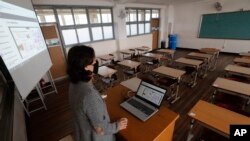South Korean students will begin taking online classes Thursday after weeks of no school amid the COVID-19 novel coronavirus outbreak.
The unexpected closure ends with first and second-year students in middle and high schools starting the new semester online. Elementary school students between the fourth and sixth grades also begin virtual learning Thursday. Public school upperclassmen began logging onto virtual classrooms on April 9.
Life is experiencing a new normal in South Korea, where new COVID-19 infections have hovered around 30 confirmed cases in recent days. South Korea has endured more than 10,590 cases of the virus and 225 deaths, though more than half of those infected have now been released from isolation, according to the Ministry of Health and Welfare.
But with five weeks of delays to their new semester, some high school students already are worried about how their academic futures will play out.
“I’m concerned because the shortening of summer vacation is going to be a big burden for high school seniors,” Jang Eun-ki, a 12th grade student at Wonjong High School on the outskirts of Seoul, told VOA News. “Summer vacation is the time that most of us use to write our personal essays for college applications and get feedback from teachers.”
Jang, who hopes to begin his university education next fall, is one of thousands of South Korean students who will now be taking their college entry exam — called the “Suneung” or CSAT — two weeks later than scheduled, on Dec. 3.
He said some students have tried studying while schools are closed, but they are distracted at home and can’t study in libraries because most public buildings also are shuttered. As it is, the South Korean government has extended social distancing guidelines to at least April 19.
“We are having a hard time focusing,” Jang said. “I can feel a lack of motivation [among us students].”
Those teaching even younger students in elementary schools are still gearing up for the online semester to start on April 20, while kindergartens are postponed indefinitely.
Virtual classrooms
So far, South Korea’s Ministry of Education has modified the school year significantly: Winter and summer vacations will be shortened, while instructional days will be made longer but fewer. The ministry also has instituted an official, government-run Preparation and Monitoring Team to help teachers develop online classes and modify their lessons. But some instructors are concerned it still may not be enough.
Ms. Kim, a public elementary school teacher who asked to keep her true name anonymous, said she and her colleagues lack important experience with virtual classrooms.
“Because of the coronavirus, we are trying a new form of teaching that we’ve never done before,” Kim said. “It would be nice if the transition to online classes went well, but I think there’s a limit to how smooth this can be because we didn’t have enough time to prepare for this.”
Moreover, Kim said she is concerned that young students will miss out on key parts of the curriculum that will have to be modified for online learning. Early elementary school students often learn key skills through group socialization and physical, hands-on activities such as painting or group games, she said — all of which will be impossible to conduct over video chat. Additionally, she said some students will not have the support at home to gather necessary supplies or even log in to their lessons.
“It’s already hard for students to concentrate in actual class at school, so I’m worried about how they’ll be able to focus during online classes at home,” Kim said. “I have lots of worries.”
For now, South Korea’s education ministry said it’s working through other issues, such as when public schools will physically open for in-person class again, and how the graduating class will be affected.
“A more specific plan for university admissions schedule reflecting the revised CSAT date will be finalized and announced … this April,” the ministry said in an April 13 press release.
Until then, students like Jang will have to cope with the unknown and wait for further changes.
“I am worried because I think online classes are less effective than face-to-face learning in school … I think this will cause big damage to us high school seniors,” Jang said.
“We’ll have to wait and see if [online classes] are a good idea. For now, I think it’s the best anyone can do.”




